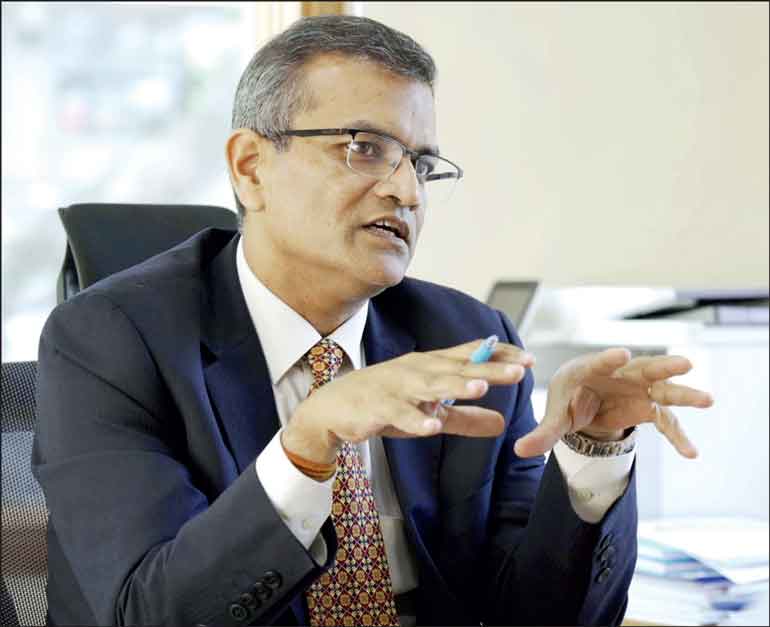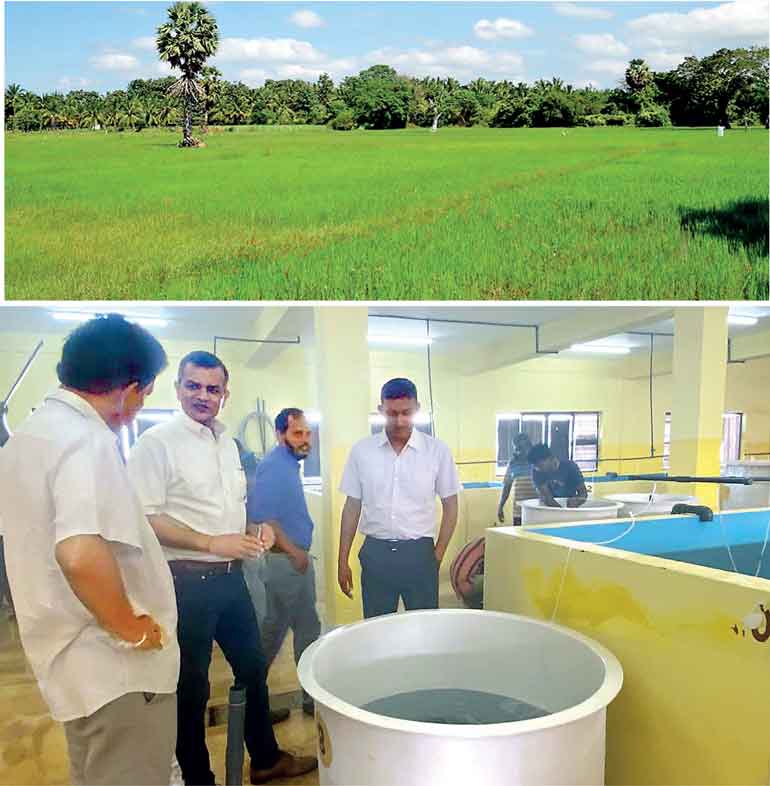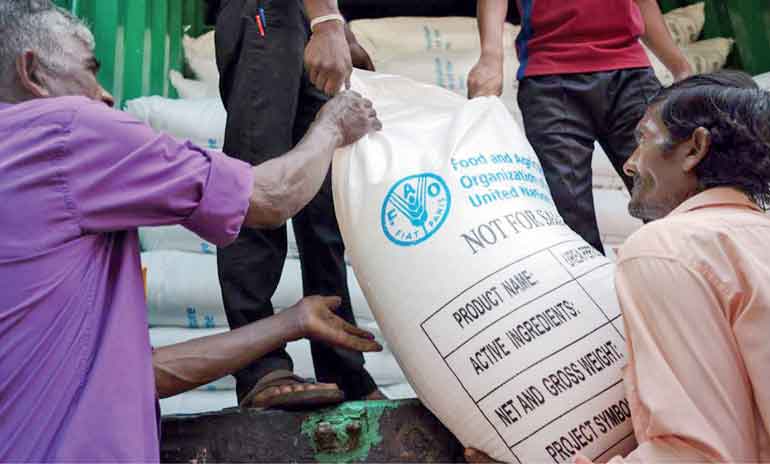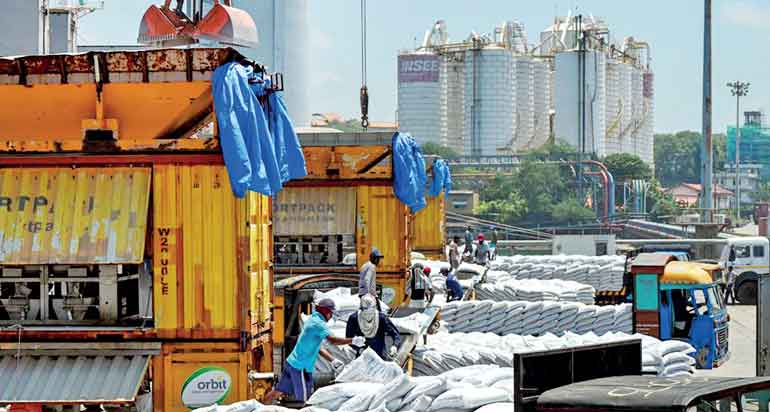Saturday Feb 21, 2026
Saturday Feb 21, 2026
Wednesday, 26 July 2023 00:10 - - {{hitsCtrl.values.hits}}

FAO Representative in Sri Lanka and the Maldives, Vimlendra Sharan

FAOR at Mannar sea cucumber hatchery

Fertiliser distribution

Fertiliser at Port
Sri Lanka faces a unique set of challenges that affect the production, accessibility, and utilisation of food for its population. Factors such as climate change, supply chain issues, economic fluctuations, and the COVID-19 pandemic further exacerbated these challenges. The Food and Agriculture Organisation of the United Nations (FAO) Representative in Sri Lanka and the Maldives, Vimlendra Sharan shares his insights into the current state of food security in Sri Lanka.
Q: We’ve seen contradictory claims regarding Sri Lanka’s crop and food security status over the past few months. What is FAO’s assessment of the situation in the country?
A: Let me take the liberty of combining two idioms together and say –“there is light at the end of the tunnel but we are not out of the woods yet.”
In May 2022, FAO, together with the World Food Program (WFP) carried out the first Crop and Food Security Assessment Mission (CFSAM) in Sri Lanka upon the invitation of the Government. The findings revealed that two consecutive seasons of poor harvests had led to a near 50% drop in production and reduced imports of food grains due to foreign exchange constraints. Production of paddy, the staple cereal, decreased by nearly 40% in 2022 due to low yields following reduced application of fertilisers.
A concerted effort by the Government supported by emergency assistance from the United Nations system and key development partners has resulted in a steady recovery. FAO, with vital financial backing from key partners, USAID, EU, and Japan successfully delivered over 58,700 metric tonnes of essential fertilisers in the span of nine months, reaching all paddy farmers in Sri Lanka. The impact of these measures is evident in the fields with the 2023 Yala paddy season sowing having reached approximately 500,000 ha, accounting for 92% of the targeted 541,134 ha as of June 2023. Based on these figures, the forecasted paddy production is 2.18 million metric tonnes, surpassing pre-crisis average production levels in Yala of 2 million metric tonnes.
Food security has also improved across all provinces, with around 17% of the population, or 3.9 million people, facing moderate acute food insecurity, a 40% decrease from the previous year. However, with poverty figures having nearly doubled in the same period, access to food remains a very serious concern.
While recovery is on track, there is an immediate need to build resilience into the agrifood system of Sri Lanka to ensure production is sustainable and the agriculture sector can withstand future shocks.
Q: Could you speak about FAO’s contribution towards supporting Sri Lanka through the agricultural and economic crisis?
A: With the generous support of our partners, FAO implemented a comprehensive approach to aid Sri Lanka's agriculture and fisheries sectors and the livelihoods impacted by the economic crisis.
The immediate need for livelihood support for smallholder farmers and small-scale fishers was provided through cash assistance and essential inputs like fertilisers. Vulnerable families were also reached with urban gardening support to increase sustainable access to nutritious produce.
Over the last one year, FAO Sri Lanka has responded with $ 55.68 million worth of intervention to aid vulnerable farmers and fishers. These interventions funded by our bilateral and multilateral partners – USAID, EU, FCDO, DFAT, Japan, Canada, New Zealand, Sweden, and others have helped FAO provide necessary agriculture inputs, including fertiliser and direct cash transfers.
However, there is still much work to be done to enhance the resilience and sustainability of the local agriculture and fisheries sectors over the coming years and FAO is constantly working with the Government in designing an effective transition plan towards a vibrant and sustainable agriculture sector.
Q: What other measures has FAO implemented to safeguard food security?
A: Fostering resilience and growth is crucial for the long-term sustainability of Sri Lanka's agrifood system. Climate change poses significant challenges, including extreme weather events like droughts and floods. To mitigate these impacts, investments in climate-smart agriculture practices are necessary. FAO, with EU’s support, is already working with over 70,000 paddy farmers on Integrated Plant Nutrient Management (IPNM) System to help enhance resource use efficiency and soil health.
We at FAO firmly believe that what is not safe is not food. To enable safe food to reach people, FAO through the European Union (EU)-funded BESPA-FOOD (Best Standardised Practices for the Agri-Food Sector) project is supporting the Government to establish a well-coordinated food safety system in the country. We are working with the Ministry of Health to redesign the existing food safety regulations which have focused primarily on end products rather than adopting a comprehensive, farm-to-table approach. To address these gaps, we are developing Sri Lanka's first food safety policy and updating the Food Act. Our aim is to facilitate a more coordinated and robust dialogue on safe food practices, benefiting all the stakeholders and especially the consumers. This project is being implemented in collaboration with UNIDO.
In collaboration with the Ministry of Environment, we have formulated $ 5.33 million GEF funded initiative to work on a sustainable, regenerative and resilient rice based food system to strengthen community and ecosystem health in three river basins of Sri Lanka.
In the Fisheries sector, with help from Norway and Republic of Korea and in close collaboration with the Ministry of Fisheries we are working on establishing a national monitoring platform for shrimp biosecurity while also developing capacity and pathways for reducing fish loss and waste in Sri Lanka. An interesting project in enhancing the capacity of sea cucumber hatchery in Mannar is underway where besides helping with necessary infrastructure and lab equipment, FAO is helping introduce IVF for sea cucumber – a first in Sri Lanka.
These are just the highlights. There are multiple other programs and I invite the readers of your paper to visit our website and follow us on social media to remain updated with our activities.
Q: What priorities have you identified in Sri Lanka, to safeguard the sustainability and resilience of Sri Lanka’s food safety sector?
A: There are multiple things in the offing. While I do not go into all, let me give your readers a peep into our work ahead.
The urgent requirement is to strengthen the agrifood system in Sri Lanka and enhance its ability to endure future challenges. This necessitates immediate action. FAO recognises this imperative and is actively assisting the Government in transitioning the sector towards science and technology-driven cultivation practices and policies.
Some of the identified priorities for FAO include the revitalisation of the paddy and maize eco-systems in the country by improving their resilience and sustainability. We are currently designing a project in four paddy-growing districts to diversify marginal paddy lands to other field crops while increasing the productivity of paddy in those districts by 5% over the next three years to gradually bridge the yield gap. We are also designing a project to revitalise the maize ecosystem by introducing conservation agriculture practices including relay and intercropping besides working on strengthening the entire value chain.
To promote climate-resilient fisheries, under one of the Norway funded projects we are working on finalising a $ 20 million project for submission to the Green Climate Fund.
To reduce Food Loss and Waste under a € 15 million Grant for Sri Lanka, FAO with some other agencies is developing a proposal to boost the circular economy in the country’s food sector. The cabinet has recently approved the signing of the grant agreement with the EU in this regard.
FAO is assiduously working on a Food Systems approach to enable holistic development of the sector, addressing not just climate change impacts but also encouraging innovation and diversification to enhance sustainable and green development of a resilient agriculture sector. We are committed to this cause, no matter how arduous the journey ahead.